The day of the drone is here. Drone technology is more advanced and capable than ever before, and innovators and pioneers across a variety of industries are learning how to put commercial drones to work. This isn't just good news from a business efficiency perspective. As uncrewed aerial vehicles (UAVs), and the powerful insights they provide from above, grow in demand, so does the need for pilots and drone program managers who can get the most out of these tools. The drone boom naturally leads to openings in drone careers.
Drones are already used for functions such as land surveying, aerial photography and videography, precision agriculture, public safety, and more. Future legal changes could introduce even more possibilities, such as long-distance package delivery. Even within the existing categories, there are many options — surveying and inspections are important for companies ranging from insurers and mine operators to real estate firms and utilities.
But what will day-to-day workloads for drone pilot jobs look like? What skills should drone operators and support staff possess? What does the licensing process look like in various countries? By discovering the answers to these questions and gathering related information, an aspiring pilot can get closer to a rewarding career in a field with a promising future.
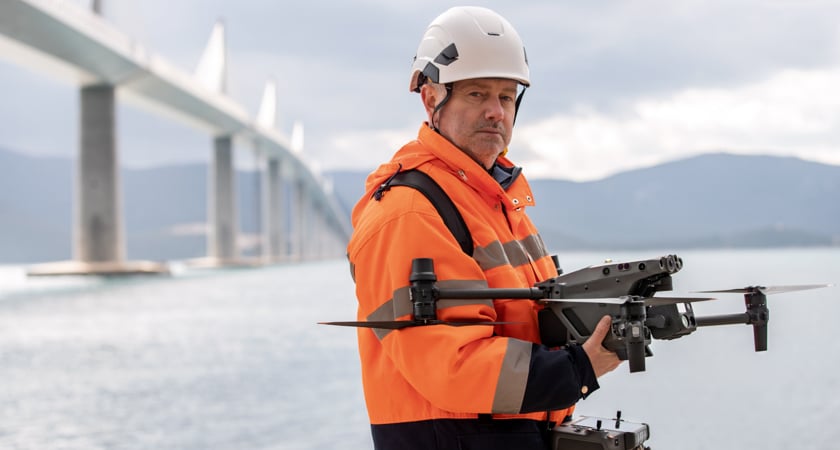
Drone careers: State of the job market
When considering drone operation as a career path, it's important to know the difference between personal and Enterprise drones. The former, affordably priced and designed for individual use, are helping drone aircraft become more popular in the public imagination. The latter, however, are the driving force behind drones' expanding role.
Business Insider reported that Enterprise drones across five categories — agriculture, construction and mining, insurance, media and telecommunications, and law enforcement — will power a 66.8% compound annual growth rate for drone sales between 2021 and 2023.
The expansion of drone use across those five industry segments shows the wide variety of situations commercial drone pilots will be expected to operate in. Some will be responsible for inspecting agricultural fields and applying chemicals from the air, while others will lead search and rescue operations and still others will be responsible for photo and video capture.
Under current industry conditions, most of these drone operators will pilot their craft from within visual range. This is due to commercial aviation laws that limit the use of aircraft beyond the visual line of sight (BVLOS). Waivers to BVLOS rules are currently rare. In the future, more approval of BVLOS operations could lead to new use cases for drones, and still more variety in career opportunities.
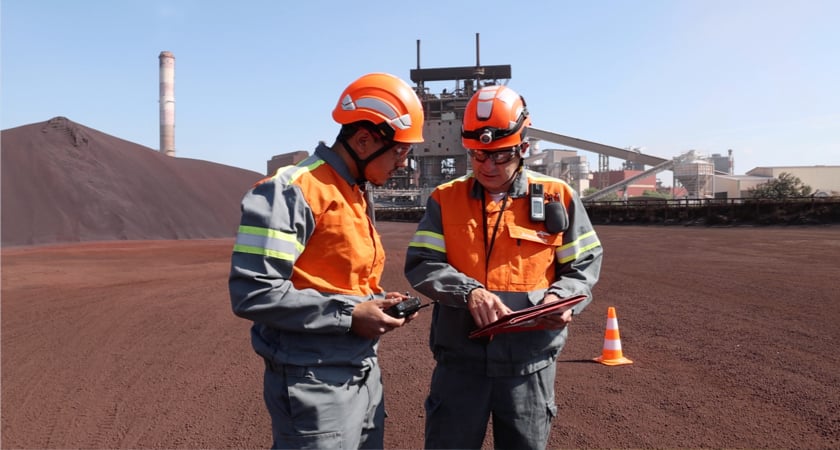
Starting out as a visual observer or sensor operator
Drone operation best practices today often involve more than one person assigned to a specific drone: a primary operator and an observer or sensor operator. Even in cases when there is no legal need to have two people on an uncrewed vehicle team, companies may use an observer or sensor operator for extra safety and quality control. Many commercial drones, like the Matrice series, support dual-control mode where a second pilot can operate cameras and sensors while the other pilot focuses on flying. Or in Search and Rescue missions, a pilot will attend to safely controlling the drone, while a spotter will look closely for the missing person or people.
In some cases, observer roles lead naturally into piloting opportunities within months or a year. Taking a crew role that does not include piloting duties may be an effective way to eventually become a commercial drone pilot within a supportive environment. Employees who prove their know-how on the ground could be likely candidates for promotion into piloting roles, as they have more familiarity with the specifics of the work they assist in completing than outside hires.
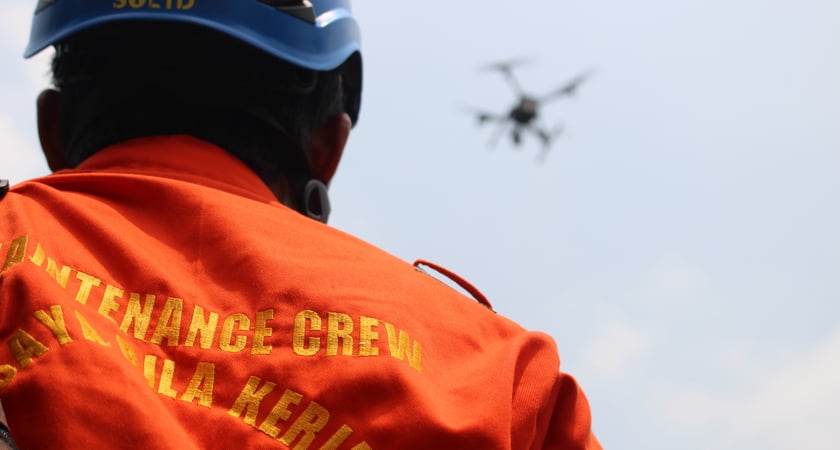
Aiming for success as a drone pilot
Considering the variety of job descriptions dealing with and companies interested in drones today, there is no one surefire path to a drone career and to success. However, there are a few solid best practices that can get a candidate flying:
- Have an appropriate license and certification: A commercial license to operate an uncrewed craft is essential to take drone jobs. The agency responsible for issuing this certification will differ by country, as will the exact application and testing process. Wherever the job in question is located, a good candidate will be licensed to fly there. Read here to learn more about how to become a commercial drone pilot.
- Network with fellow pilots: Finding drone jobs is not necessarily a competition. When a company hires one drone pilot, it may seek out several more employees at the same time to build a more comprehensive drone team. Candidates who network with other pilots may be able to follow them to businesses hiring en masse.
- Stay active online and on social media: There are multiple online paths to drone operation work. Searching sites specifically targeting the drone sector is one way to learn about job openings, though these tend to be entry-level jobs rather than more established roles. In the end, LinkedIn may prove to be a pilot's best resource.
- Consider purchasing drone insurance: Although drones are the safest form of aviation the world has ever known, anyone aiming to build a drone career should consider protecting themselves with drone insurance. From hull and liability insurance to pricing, click here to learn more about drone insurance. Additionally, you can opt for a DJI Care Enterprise coverage plan that offers repairs, replacement parts, and more.
- Create a niche and a personal brand: In some cases, being a drone operator isn't about becoming an interchangeable part of a corporate hierarchy. Instead, jobs are given out on an independent contractor basis. A drone pilot can operate as an entrepreneur, making a claim to a particular niche. Maybe an individual pilot is great at photography jobs or has had success in utility inspections; conveying that history effectively is a way to find more work.
Turning drone piloting into a long-term career is an involved process, and becoming established in the field can take time and effort. However, once a pilot proves their ability to get jobs done safely and effectively, numerous opportunities can arise. Companies today are frequently searching for uncrewed aerial vehicle operators, and the need will only intensify over time.
Focusing on drone safety
While there are many elements that go into achieving success as a drone operator, the most important is the consistent safe operation of equipment. Safety is more than a simple matter of meeting requirements and obeying aviation laws, though those are essential priorities. Rather, being a safe pilot is the foundation on which all other drone piloting skills are built.
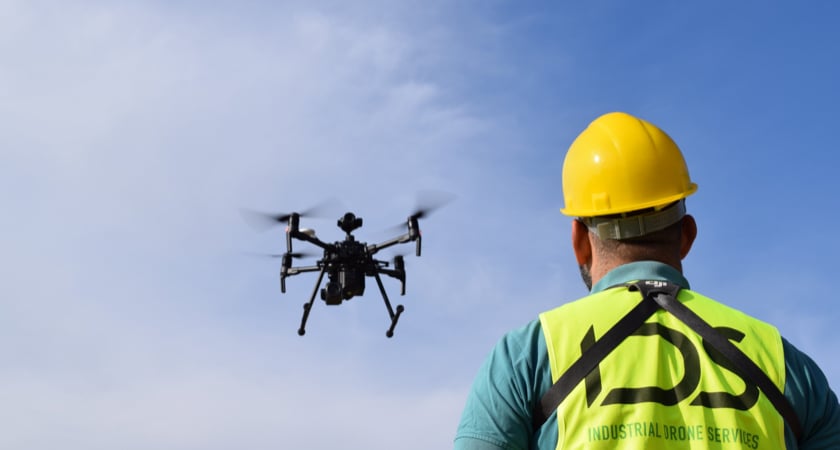
Becoming a professional drone pilot means embodying safety and efficiency. While a recreational drone pilot may have picked up flying as a hobby, a commercial drone operator needs to understand they are working with expensive and high-powered equipment that could cause serious harm or property damage if an error were to occur.
Safety affects employment prospects in many ways. Aspiring drone operators should:
- Understand drone safety: When searching for jobs that can lead to long-term drone pilot careers, safety is paramount. Employers won't hire pilots who don't prioritize safe and reliable operations. A flying accident, or even a near-miss that results in regulatory violations, can be hugely damaging for a drone program and a company at large. Therefore, hiring managers will gravitate toward pilot candidates who have a track record of safety.
- Work with checklists: Pre-flight, in-flight, and post-flight checklists are excellent ways to ensure your equipment is used properly and safely. Veteran drone pilots who have built drone careers can attest - adherence to safety checklists simplifies everything and helps you manage crew and equipment resources to guarantee success.
- Use appropriate PPE on the ground: Being a safe operator goes beyond piloting skills to encompass the way a pilot acts on the ground, and even what they wear. Depending on the work environment, a drone pilot's personal protective equipment (PPE) can consist of a hard hat, a high-visibility vest, and steel-toed boots. Fire retardant gear is also something to consider. Regular use of safe gear is another way to show a serious, safety-first mindset.
A focus on safety and responsible equipment use can make a strong positive impression on employers, none of which want to increase their risk of experiencing an incident.
Licensure and certification for drone careers
There is no international body that certifies drone pilots to operate commercially. This means that wherever the next job takes an aspiring drone operator, they must have the appropriate license for that country or territory.
Before starting to operate drones in any given location, it's essential to check in with local aviation authorities and make sure all licensing issues are addressed. Some countries may simply disallow various types of drones or operational styles — such as BVLOS — and it's far better to know in advance than be caught out of compliance.
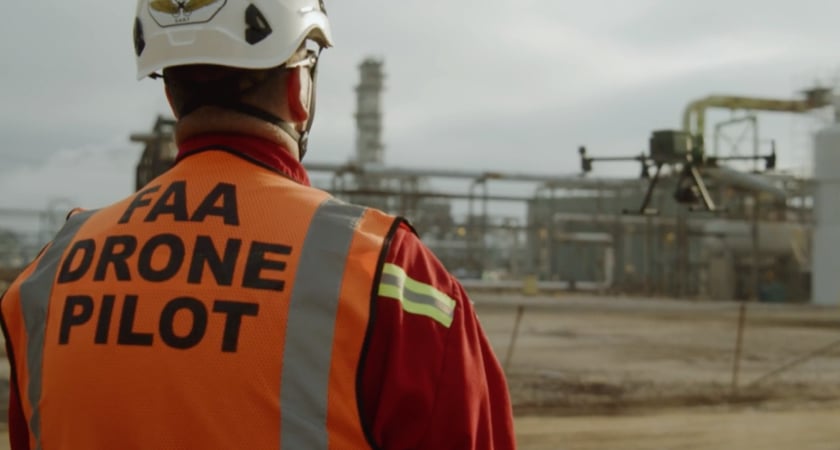
The following are the general details of commercial uncrewed aircraft flight law across the U.S., Canada, the EU, and Australia.
United States: Federal Aviation Administration (FAA)
Commercial drone flight involving craft 55 pounds and lighter in the U.S. is regulated by FAA Part 107. There are specific rules and regulations in Part 107, such as operation in the airspace over people. For example, while night flight no longer requires a waiver, flight over people has specific guidelines. If a pilot's intended drone use involves practices outside of the regulations, waivers are required.
Canada: Transport Canada Civil Aviation (TCCA)
In Canada, the regulations and licensing procedures around drone operation form part of the more comprehensive Canadian Air Regulations (CARs). The necessary knowledge for drone pilots was most recently updated in 2019 and covers only visual line of sight operation, due to the fact that BVLOS is allowed only on a case-by-case waiver basis in Canada.
Australia: Civil Aviation Safety Authority (CASA)
The commercial drone operator licensing procedure in Australia involves securing a certification known as a remote pilot license (RePL). There are exceptions to this process for landowners flying medium-sized commercial drones over their own property. CASA is continually investigating ways to modernize drone regulations and has announced a public consultation on the matter.
European Union: European Union Aviation Safety Agency (EASA)
As of 2021, there is now a unified law governing drone operation in all EU member states. The rules, 2019/947 and 2019/945, supersede the previous systems of laws around uncrewed aerial vehicles in those countries. It's worth noting that the EU rules are not divided between commercial and recreational use.
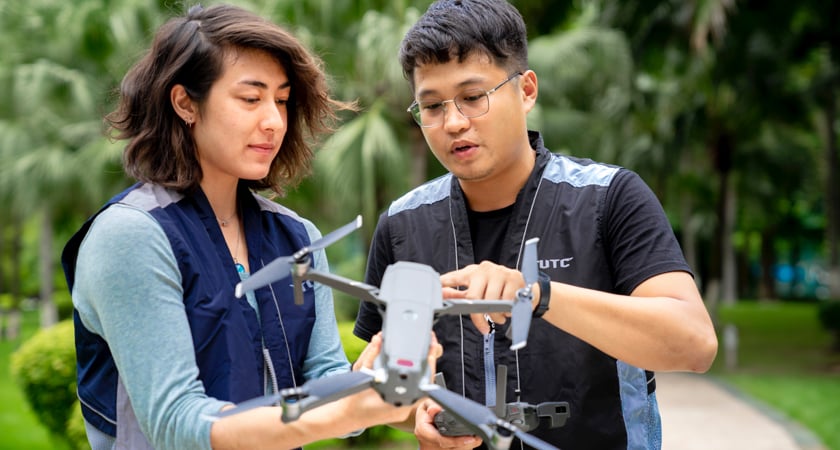
Getting started on learning
After deciding to earn one of these licenses or certificates, it's natural for aspiring drone pilots to wonder where they can build their skills and learn the necessary competencies. Fortunately, there are several options available that will help them get started,
Some of the options are paid courses, distributed by app or through websites. By focusing on test preparation, these services help aspiring pilots build the kind of knowledge and expertise they will need to go from hobbyists to certified commercial drone pilots.
Other test and study guide materials are distributed for free via sites such as YouTube. These are created by content providers that make their money through other means, such as affiliations and partnership programs, to allow them to release their courses for free.
Whichever way a learner chooses to build their knowledge, the road to drone piloting on a professional basis will have to involve specialized education leading up to a license test. Where they go from there depends on their specific interests.
Top drone career opportunities
While more and more people are building careers in the drone industry, this is still a relatively new profession. Over the past few decades, uncrewed aerial vehicle technology has developed rapidly, making full-time drone operation jobs a viable and ever-evolving career option. PayScale data remains limited on these professions as of December 2021, with a median salary around $50,000 and the upper 10% of earners making more than $95,000 a year.
There are openings for skilled commercial drone operators across many industries, with more arising as laws and drone technology evolve. With that said, some sectors are especially promising for drone pilots seeking steady, rewarding work.
The following are a few of the roles seeing interest and demand around drone use at the moment, along with some of the factors that make them unique and the types of work pilots will be expected to perform if hired.
Inspection in the utility sector
Utility inspection is challenging in ways that make it a perfect job for drones. Companies need to take highly accurate readings and imagery around infrastructure and geographic features, often in areas that are hard to reach on foot or with ground-based vehicles.
What makes this role unique?
Utility infrastructure such as power lines, wind turbines, solar farms, and pipelines has to cover vast distances. In many cases, this has led to companies turning to drones in place of ground-based inspection crews when it's time to inspect equipment and search for damage or wear.
The key to a strong, reliable grid is proactive maintenance. Making frequent, targeted inspections of infrastructure instead of waiting for failure is a good way to ensure reliable service. By employing crews with drones, organizations can embrace these principles with fewer employees and less exertion, getting close to equipment that is remote, on rough terrain or both.
What do drone operators do?
Drone operators providing utility inspection services are tasked with collecting accurate, high-quality imagery. They may work in teams, with one pilot and another observer on hand. While in the future, utility surveying may be a promising use case for BVLOS flight, BVLOS waivers are currently rare.
Specialized skills are necessary to navigate an uncrewed aerial vehicle close to electrical infrastructure and collect data. Fortunately, some utility organizations provide training courses for inspectors. Drone pilots need to already be certified for commercial operation to enter the courses, but completion can prepare these workers to take on new duties in this in-demand field.
Filming and photography in entertainment
The classic Hollywood crane shot has met its successor — the drone shot. Aerial photography can be a major boost to a film, television show or commercial shoot, and there is a special niche for drone pilots who are skilled at capturing video and still images from the air.
What makes this role unique?
One of the things that defines drone use in the entertainment industry is the strict time limits involved and the need to stick to schedules. The necessity of keeping a shoot on track and not interfering with the proceedings means drone operators must be confident in their ability to complete tasks on the first attempt. Flying for film purposes is therefore considered one of the higher-stress forms of drone operation.
Drone operators in the entertainment industry need to have knowledge that goes beyond the use of their equipment. They must understand the rudiments of cinematography and be able to communicate with directors and camera operators in cinematic language.
What do drone operators do?
A drone operator working on a film shoot will be tasked with capturing film shots from the unique perspective provided by their drones. They may work independently, controlling both drone and camera, or as part of a team with one operator assigned to each task. While piloting skill is clearly important to this work, filming ability may be considered more important by directors.
Drone operators in film will be called on to get specific shots, often in language that is unique to cinematography, rather than piloting. They will have to use this input and get the take, while potentially dealing with constraints such as a need to capture a shot before the light changes. A camera operator learning to pilot a drone may have more success in film than a drone operator who learns cinematography.
Elevating search and rescue with drones
Search and rescue missions often take place in rural, rugged places, with challenging terrain and environments. These factors can make it challenging for ground teams, especially when search areas span vast distances. On top of this, many search and rescue missions occur at night because victims only call for help when the sun is setting and their phone batteries are dying.
What makes this role unique?
Drones provide an essential eye in the sky during search and rescue missions, allowing for more ground to be covered, and the missing person or people to be located sooner. Enterprise drones like the M300 RTK can be outfitted with a thermal camera like the H20T or H20N, while other drones like the M30T or the Mavic 2 Enterprise Advanced have thermal sensors built in. These advanced sensors help search teams see through the night and even identify the heat signatures of those who are lost. Altogether, drones make the entire mission safer, both for victims and for search teams.
What do drone operators do?
Drones operators in search and rescue missions need to be calm under pressure and to have proper training and preparation. Many drone pilots for search and rescue teams are volunteers and offer their help to local rescue organizations when the need arises. As a volunteer, you still should learn more details about search in rescue in order to helpfully integrate into the team.
For professional rescue teams, the role demands are quite similar, albeit with more capable Enterprise drones. As you fly over the search areas, you need to keep an eye out not only for your missing person but also for obstacles and changes in elevation that could endanger your drone. More advanced Enterprise model drones offer dual control mode, where one pilot controls the drone, while another controls the gimbal and camera.
Precision farming oversight in agriculture
Farming today can be far more precise and efficient than in the early days of mechanized agriculture, and drones are one of the technological advancements responsible for this transition. Drones play multiple roles in precision agriculture, from providing highly accurate aerial information about field conditions to distributing pesticides and fertilizers in specific areas.
What makes this role unique?
Flying drones in a farm setting is often part of a broader precision agriculture project, which involves using land in highly specific ways. This is an efficient style of farming, because fields can be subdivided into small units and receive appropriate care and attention.
Precision agriculture aided by aerial scans from drones can also help farms get in line with tightening rules around the use of pesticides and other chemicals. Drones allow a degree of control that more standard farming equipment can't support.
What do drone operators do?
Drone operators in agriculture will likely be tasked with either surveying fields, spraying crops or both. These jobs call for flights over various kinds of terrain and the collection and use of accurate data.
Drone operators can expand farm operations further beyond standard parameters if they have the equipment and skills to work at night, adding extra shifts to the day. The same abilities that make a pilot suited for a job in surveying may help that professional excel in farming.
The future of drone careers
The sky's the limit for careers in drone operation. Evolving laws may soon enable flying practices that are currently limited or allowed only by waiver — such as BVLOS operation and swarming (one operator controlling many drones). Sufficiently advanced drone technology exists, so these changes could come quickly.
In addition to roles in fields already heavily invested in drones, jobs including long-distance package delivery could soon become prime opportunities for drone operators. There are ample reasons to begin learning the practices of the trade now.








.png?width=300&name=L3kv%20(1).png)